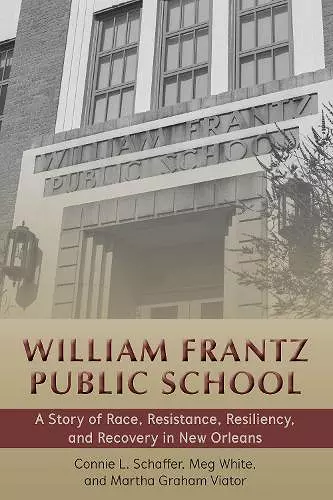William Frantz Public School
A Story of Race, Resistance, Resiliency, and Recovery in New Orleans
Connie L Schaffer author Meg White author Martha Graham Viator author Alan R Sadovnik editor Susan F Semel editor
Format:Hardback
Publisher:Peter Lang Publishing Inc
Published:28th Sep '20
Currently unavailable, and unfortunately no date known when it will be back
This hardback is available in another edition too:
- Paperback£33.17was £36.85(9781433183003)

Why should you care about what happened to William Frantz Public School? Yes, Ruby Bridges entered the iconic doors of William Frantz in 1960, but the building’s unique role in New Orleans school desegregation is only one part of the important history of this school. Many additional and equally important stories have unfolded within its walls and the neighborhoods surrounding it. These stories matter.
It matters that society has historically marginalized Black students and continues to do so. It matters that attempts to dismantle systemic racism in schools and other institutions still face strong resistance, and these issues continue to deeply divide the United States. It matters that the building remains standing as an indomitable symbol of the resiliency of public education despite decades of waning support, misguided accountability, and a city devasted by Hurricane Katrina. It matters that opportunism, under the guise of recovery, reshaped public education in New Orleans.
William Frantz Public School: A Story of Race, Resistance, Resiliency, and Recovery in New Orleans provides more than an examination of education in one school and one city. It recounts a story that matters to anyone who cares about public education.
“In this comprehensive study of a neighborhood school in New Orleans, authors Schaffer, White, and Viator take the reader from the Jim Crow South to the 21st century while reflecting on profound social and economic changes that affected the city over an 80-year span. The book details how William Frantz Public School, built upon a segregated foundation, grabbed the nation’s attention as a battleground of school desegregation. Ruby Bridges’ story became a familiar chapter in the Civil Rights Movement; however, the school and the community it served suffered greatly from lack of support, and William Frantz Public School again became a symbol of inequality of the American education system. In the wake of Hurricane Katrina, changes in the city’s education system brought new challenges to the school. The authors’ incredible in-depth research weaves the stories of William Frantz Public School into an easy-to-understand narrative that builds upon scholarship surrounding education, segregation and desegregation, the Civil Rights Movement in New Orleans, and Hurricane Katrina. William Frantz Public School is a fascinating story of what one school would have to say about race, class, and education in America.” —Phillip Cunningham, Head of Research Services, Amistad Research Center, New Orleans, LA
“Intense, captivating, and horrible in its reality, William Frantz Public School is a story overdue for the telling—a must read for those seeking to understand New Orleans’ history and the lingering impact of White racial superiority upon the Black community and city infrastructure.” —Mercedes K. Schneider, Ph.D., Southern Louisiana native and author, School Choice: The End of Public Education?
“William Frantz Public School narrates the struggles for civil rights that Ruby Bridges and this one school in New Orleans endured. But the authors’ account is also America’s story, its engagement with slavery prior to the Civil War, and the fight to ensure that systemic racism does not upend the progress the nation has made. The ‘before’ and ‘after’ Hurricane Katrina narrative of the evolution of neighborhood schools and the devolution in 2006 toward an all-charter school district is compelling. This meticulously researched book is a sober reminder that Martin Luther King’s metaphoric ‘arc’ leaning toward justice does not bend neatly.” —Luis Mirón, President, Advisory Board Education Research Alliance, Tulane University, New Orleans, LA
ISBN: 9781433158681
Dimensions: unknown
Weight: 530g
302 pages
New edition